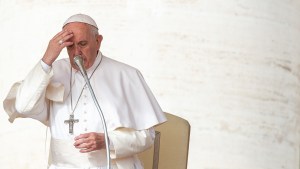Our family recently picked up the habit of praying Evening Prayer from the Liturgy of the Hours — an ancient tradition of the Church, the highest form of prayer after the Mass, and, according to Pope St. Paul VI, “the high point which family prayer can reach” (Marialis Cultus 54).
Our 5-year-old, having not yet learned to read, has fallen into the role of reciting for us the Our Father, which is included in every Evening Prayer. And although it’s a prayer she has said many times and committed to memory, three phrases in particular have given her some trouble.
One day we’ll correct these precious slip-ups, as every parent knows they have to, especially for such crucially important words as these. But in the meantime, I’ve found that her mistakes are not only cute but also profound. Each accidental phrase is rich with meaning of which she’s not even aware — because out of the mouths of children, God has prepared praise for himself (Matt. 21:16).
1: “Our Father, who art in heaven, how do we begin?”
We know how to begin of course — by keeping holy God’s name — and indeed, our daughter has since corrected this one on her own. But it’s understandable that she struggled with the archaic “hallowed be,” and there’s something so poignant about her misinterpretation: “How do we begin?”
Sometimes we find ourselves as tongue-tied as Zechariah before God (Luke 1:20) — which is precisely why the Church in her wisdom gives us structured prayers. How many people out there, having never talked to God — or at least, not for a long time — are taking their first baby steps into prayer, having no idea how to start the conversation? How many seasoned pray-ers are closing their eyes or falling to their knees in prayer, and — overwhelmed by the trials, confusions, and ambiguities of this earthly pilgrimage — find themselves at a loss?
But beyond these bafflements both monumental and mundane, “How do we begin?” also calls to mind, at least for me, the ultimate tongue-tied encounter with the mystery of God: life after death. One day we will, God willing, see him face to face and begin an eternal dialogue.
“In my end,” wrote T.S. Eliot, “is my beginning.” That dialogue will of course last forever, but it can only begin once. What will it be like? What will we say when the Father sees us and we see the Father, each revealed as we really are? How will we begin?
2: “Thy kingdom come, as will be done . . .”
The great petition of the Lord’s Prayer that God’s will be done reflects the life of the Lord himself, whose very food was to do the will of the Father (John 4:34). It’s a reorientation of our being from what we want, to what God wants. “That man is Your best servant,” Augustine wrote in the Confessions, “who is not so much concerned to hear from You what he wills as to will what he hears from You.”
But this second misspeaking opens up another dimension of the previous petition, “Thy kingdom come.” The arrival of God’s kingdom, our daughter accidentally but correctly prayed, will come to pass; it’s not a question of if but of when.
Indeed, the kingdom already has come in person through Christ, who conquered sin and death. But the great fulfillment of this “already” is in the “not yet,” the Second Coming, and this Parousia will renew the face of the earth, “so that God may be all in all” (1 Cor. 15:28).
The fullness of the kingdom will come — and the more the Christian internalizes this, the more he can’t help but live in hope and joy.
3: “Give us this day our daily breath . . .”
Christ’s petition for “our daily bread” beautifully references both the ordinary food that sustains us on earth, and the extraordinary food that prepares us for heaven — namely, the Eucharist. Indeed, the literal meaning of epiousion, translated as “daily,” is “supersubstantial,” and the Lord’s Prayer is the only use of this mysterious word in the entire Bible.
But I’ve come to appreciate our own daughter’s “mistranslation” of this verse: “our daily breath.” Just as we depend on God for our daily food, so we depend on him for every beat of our heart and every breath in our lungs. We can accelerate or decelerate our heartrate through exercise or meditation, and we can control the speed, rhythm, and depth of our breathing. But we can’t command our own heart to beat, and we can’t refuse to breathe our next breath — not without ceasing to live.
All that we have and all that we are flows to us as a gift from the Creator: “What do you have that you did not receive? And if you received it, why do you boast as if it were not a gift?” (1 Cor. 4:7). Contemplating “our daily breath” reminds us just how utterly dependent we are on our Creator, and how not a single day or even moment is owed to us.
So the next time you look up to heaven and pray the ancient words of the Our Father, maybe also remember these curious phrases and their lessons: that it’s okay to not know what to say to God; that the kingdom we pray for will indeed come; and that every breath is a gift from above.




